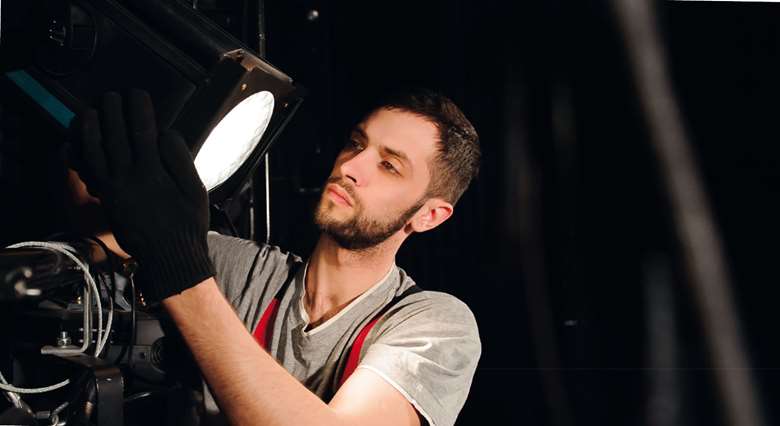Staying linked in
Nick Smurthwaite
Tuesday, December 1, 2020
Theatre apprenticeships are a vital way for young people to break into the industry. But what happened to the country's technical apprentices when lockdown hit? Nick Smurthwaite finds out

ADOBE STOCK/NAGAETS
Imagine being a technical apprentice back in March, halfway through your training, when lockdown brought UK theatres to a standstill. Even if you were lucky enough to be furloughed, there were the additional problems – which still remain for many – of how to advance your career prospects and how to stay positive.
Put on hold
Many were let go by theatres and technical departments because there was nothing for them to do, and their salaries were a drain on dwindling resources.
For Bryan Raven, founder-director of White Light, the leading theatre lighting company, it was a simple matter of economics. ‘Our warehouse staffhas been reduced from 85 to 25, so we had to lose all but two of our apprentices because they were on full pay. Also, while you may not be paying a lot for the apprentices’ labour, you're expecting full-time, more expensive members of staffto spend time supervising them.’
What of the apprentices who had yet to complete their end point assessment (EPA), or finals, when lockdown struck?
John Young, one of the UK's three technical apprenticeship assessors, got together with the Institute for Apprenticeships and Technical Education to come up with the ‘COVID variation’, allowing apprentices to achieve their qualification remotely.
He says, ‘Normally apprentices doing their EPA would have to be observed doing a practical task at their place of work, with the assessor spending a couple of hours watching them at work. Obviously, that wasn't possible, so this took the form of an online powerpoint presentation, explaining their role in as much detail as possible.’
Uneven playing field
Finding themselves in a position of having to conduct a fluent yet remote presentation would, one might imagine, put a lot of apprentices at a disadvantage. At least 80 per cent of any technical apprentice's time is spent doing practical tasks in the workplace. The vast majority have deliberately chosen a vocational rather than an academic path.
Young continues, ‘There were no marks lost for presentational ability, because we are aware that a lot of people in technical theatre are not used to exercising their skills in that way. Content was everything.’
Unsurprisingly, before Young and his colleagues came up with this remote way of qualifying, those apprentices stranded in a nojob, no-qualification limbo were experiencing significant mental health issues. ‘They couldn't qualify, and they couldn't move on,’ says Young, ‘and in many cases, they were finding it extremely difficult to make ends meet.’
Helping hand
The training provider Creative Alliance, based in Birmingham, has been proactive in encouraging mentors and technical managers to keep in touch with their apprentices, either individually or on group video chats.
Mentor and assessor Louise Birchall says that at times, ‘It has felt like being a mental health nurse, dealing with the anxiety and not knowing when they'll be able to resume their apprenticeships.’
The plight of technical apprentices came to the attention of 30-year-old lighting technician Tamykha Patterson, who is also a young associate representative of the Association of British Theatre Technicians (ABTT).
Like every other theatre worker in the country, freelancer Patterson has been personally affected by lockdown. ‘Venues were being very supportive of their staff, holding group Zooms and so on, and being freelance, I wasn't part of that. I felt quite lonely and isolated, and I started to wonder how apprentices must be feeling, having been one myself.’
Proactive response
So, she created the UK Theatre & Live Events Apprenticeship Network, ‘a safe space’ on LinkedIn where apprentices could come together and voice their opinions and their concerns. ‘I wanted them to feel that there are people out there they can reach out to, as well as build themselves a professional profile on LinkedIn.’
With the help of ABTT, Patterson got a panel of technical experts together for a Zoom event involving some 50 apprentices, mentors, and experts from all over the UK, chaired by herself. There have been two further events since.
She says, ‘I don't normally like speaking in public, but it was something I felt I had to do. As someone who'd been through an apprenticeship, I understood how they must be feeling. For many, their anxiety is: “Can I finish my training and if so, where, and when, and is there going to be funding to finish the journey I've already started?”’
John Young feels that employment opportunities may be afforded to apprentices in the months to come as a result of people taking redundancy or early retirement.
Bryan Raven is also quietly optimistic about the prospect of re-employing some of the apprentices he had to let go. ‘If the theatre springs back quicker than we expected, I think we'd off er them their jobs back. Our apprenticeships have been a success story. The company has been built on apprentices.’
For further information about the UK Theatre & Live Events Apprenticeship Network, visit abtt.org.uk/committees/abtt-apprenticeshipnetwork
To view or join the group on LinkedIn, visit linkedin.com/groups/8953424

